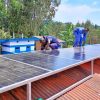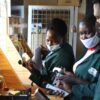More women engineers for Benin’s energy sector

Benin’s energy sector is dominated by men, especially in the technical professions. The Ministry of Energy wants to change that. It has set up a Gender and Development Department to push for change. With the support of Green People´s Energy, it has hosted a trainee programme for eight women engineers, achieving more than just good training.
“Dear sisters, cherish your dreams, have confidence in your abilities and work harder,” says engineer Raïnatou Coulibaly. In front of her sit numerous students from the Collège d’Enseignement Général (CEG), a secondary school in Pobè. The town in Benin is about an hour and a half’s drive from the capital Porto-Novo. The young woman holds the microphone casually in her hand. She laughs as she talks about the country’s energy supply, her work as an engineer and why more women are needed in this growing sector.
She herself is a good example of this – because she is still an exception. “The share of women in technical jobs in Benin’s public energy sector is just 1.4 percent,” a gender study by Benin’s Ministry of Energy revealed. Not wanting to leave it at that, the Energy Ministry decided to increase the visibility of women in Benin’s energy sector. Already in 2018, it set up the Gender and Development Department in-house.
Its head Anne-Marie Gnancadja Bonou is pursuing this goal with various measures. “There are now more professional women, engineers and entrepreneurs in the energy sector,” she sums up. But there should be more. That is why she initiated the project “Capacity Building for Young Women Engineers in the Energy Sector”, funded by the Small Projects Fund of Green People´s Energy. As part of this, Anne-Marie Gnancadja Bonou set up a trainee programme for female university graduates with an engineering degree and selected eight young women between the ages of 25 and 35 through a competition.
Thinking huge – and dreaming big
The 14-month, practice-oriented trainee programme not only includes excellent training with workshops and travel for the eight participants, but is also intended to sensitise schoolgirls to technical professions and the opportunities they offer. That is why Anne-Marie Gnancadja Bonou is visiting a total of five schools with the eight female engineers, where she specifically wants to get girls to think and dream bigger. The CEG in Pobè is the first such school.
To reach the public as well as schoolgirls, the campaign is accompanied by the ministry’s media team. In the interview, the head of the gender department tells us about the programme, which she will later also tell the schoolgirls: “Some of the female engineers went through the entire production chain in a power plant. Others worked in the control unit. Two other female engineers worked on a study for planning a solar power plant”. The eight women engineers also got to know all the central directorates of the ministry. Besides the practical work, they were also able to visit the Maria Gleta1 thermal power plant, the Illoulofin solar power plant or the Nangbeto hydroelectric power plant in Togo.
Women perform just as well as men
In addition to these training goals, Anne-Marie Gnancadja Bonou and the Ministry of Energy also pursue the vision of changing a traditional understanding of roles between men and women and supporting those women who want to work in the energy sector.
The female engineers have shown “that they can set up solar plants, carry out maintenance work on the electricity grid and drive a power plant. And they have proven that they are just as capable as men,” says Anne-Marie Gnancadja Bonou.
It is this message that she wants to embed in the young girls and aspiring women, whether at the Collège d’enseignement général (CEG) in Pobè or, as six weeks later, at the Lycé Mathieu Bouke in Parakou – 360 kilometres north of Porot-Novo.
“We earn good money”
The students listen to her and the engineers. Again and again, hands go up. They want to know more about renewable energies, how a power plant works, whether the work is hard and whether you can earn money with it. “Yes, of course we earn good money with our work,” says Raïnatou Coulibaly with a laugh. For her and the other engineers, the project was also an economic success. Most of them have found permanent and well-paid jobs in the energy sector after their paid internship. Apart from the financial aspect, she also emphasises the collegial interaction with the mainly male colleagues in the different departments and working fields.
Whether her visit can influence the career aspirations of the schoolgirls, no one knows at this moment. In any case, Anne-Marie Gnancadja Bonou and the female engineers show the schoolgirls an additional perspective. “I have understood that women can also take up these technical professions, which come with many advantages,” says Abdoulaye Aarifa in Parakou. This is the thinking that Anne-Marie Gnancadja Bonou wants to strengthen in girls. “It is now time for you young sisters to emulate women engineers,” she concludes.





